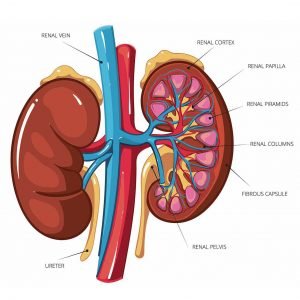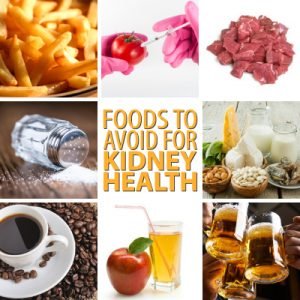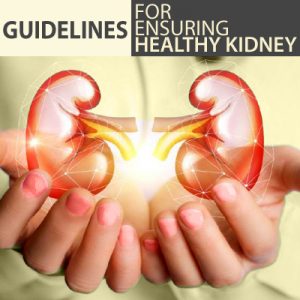Review of the Article: The article provided a comprehensive guide on kidney disease, its symptoms, and the foods to avoid for maintaining kidney health. It highlighted the importance of a balanced diet and lifestyle in preventing kidney disease. However, we provide the reader with the most recent and relevant information.
Kidney disease is a growing health concern worldwide, with an increasing number of people being affected. The kidneys play a crucial role in our body, filtering waste products from the blood and regulating fluid balance. However, certain foods and lifestyle habits can put undue stress on these vital organs, leading to kidney disease. This article provides an updated guide on the best foods for kidney disease, helping you make informed dietary choices to support your kidney health.

Understanding Kidney Disease
Kidney disease, particularly chronic kidney disease (CKD), is a prevalent health issue affecting millions of people globally. It is more common in people aged 60 or older, but younger individuals are not immune. Kidney disease can lead to serious health complications, including kidney failure, necessitating dialysis or a kidney transplant.
Symptoms of Kidney Disease
Recognizing the symptoms of kidney disease can help in early detection and treatment. Some common symptoms include:
- Blood in Urine: This could indicate a problem with your kidneys. Although it doesn’t always mean you have kidney disease, it’s essential to seek medical advice if you notice this symptom.
- Protein in Urine: An excess amount of protein in your urine could be a sign of kidney disease. The kidneys’ primary function is to filter waste from your blood and regulate fluid balance. If they’re damaged, protein may leak from your blood into your urine.
- Kidney Stones: This is a common condition worldwide. Kidney stones can cause severe pain and may require surgical intervention.
- Kidney Infection: This occurs when bacteria spread to your kidneys, causing symptoms like fever, pain, vomiting, and general weakness.
- Hepatitis C: This viral disease primarily affects the liver but can also damage the kidneys.
What are The 10 Foods to Avoid with Kidney Disease
Certain foods can exacerbate kidney disease by increasing blood pressure, causing diabetes, or directly damaging the kidneys. Here are some foods you should limit or avoid:

- Table Salt: High sodium intake can lead to high blood pressure, a risk factor for kidney damage.
- Meat: High intake of animal protein can increase the risk of kidney stones2.
- Processed Foods: These often contain high amounts of sodium and sugar, which can increase blood pressure.
- Fried Foods: These are high in unhealthy fats, which can raise blood pressure.
- Genetically Modified Foods: These may contain harmful pesticides that can damage the kidneys.
- Caffeine: Excessive caffeine intake can increase blood pressure and the risk of kidney stones.
- Alcohol: Excessive alcohol consumption can put stress on the kidneys and liver.
- Calcium-Rich Foods: Excessive calcium intake can lead to kidney stones.
- Fruit Juice: Commercial fruit juices may contain added sugars and other harmful chemicals.
- Unhygienic Food and Drink Containers: Germs from unwashed containers can cause infections that can damage the liver and kidneys.
What are the Best Foods for Kidney Disease
While it’s crucial to know what foods to avoid, it’s equally important to know what foods to include in your diet. Here are some kidney-friendly foods:
- Cauliflower: This vegetable is rich in vitamin K, folate, and fiber, and also contains antioxidants and anti-inflammatory compounds.
- Blueberries: These are low in sodium, phosphorus, and potassium, and rich in nutrients and antioxidants known as anthocyanins.
- Sea Bass: This fish provides high-quality protein and contains healthy fats called omega-3s.
- Red Grapes: These can decrease inflammation and help protect your kidneys.
- Egg Whites: They provide a pure source of protein while limiting phosphorus.
- Garlic: Garlic is a good salt substitute and adds flavor to your dishes. It also has anti-inflammatory properties.
- Buckwheat: This is a nutritious whole grain that is high in fiber and nutrients, including B vitamins, magnesium, iron, and folate.
- Olive Oil: This is a healthy source of fat and contains an anti-inflammatory compound called oleocanthal.
- Bulgur: This is a whole-grain wheat product that is high in fiber and magnesium.
- Cabbage: This is low in potassium and high in vitamin K and vitamin C.
Some Important Tips for Kidney Health

- Stay Hydrated: Drinking plenty of water helps your kidneys flush out waste products and toxins. Aim for eight glasses of water daily or as recommended by your doctor.
- Manage Blood Sugar: High blood sugar can damage your kidneys. If you have diabetes, it’s essential to manage your blood sugar levels through diet, exercise, and medication.
- Maintain a Healthy Weight: Excess weight puts a strain on your entire body, including your kidneys. Aim for a healthy weight through a balanced diet and regular exercise.
- Don’t Smoke: Smoking can decrease blood flow to the kidneys and worsen kidney function. If you smoke, quitting is one of the best things you can do for your overall health, including your kidneys.
- Regular Checkups: Schedule regular checkups with your doctor to monitor your kidney function and make necessary adjustments to your treatment plan.
Final Verdict
Maintaining kidney health is crucial for overall well-being. By making informed dietary choices, you can support your kidney health and potentially prevent further damage. Remember, everyone’s dietary needs are unique, especially those with kidney disease. Therefore, it’s essential to consult with a healthcare professional for personalized dietary advice. Stay healthy, and make your kidneys happy!
You May Also Like : Eat Some Best Foods For Kidney Health
